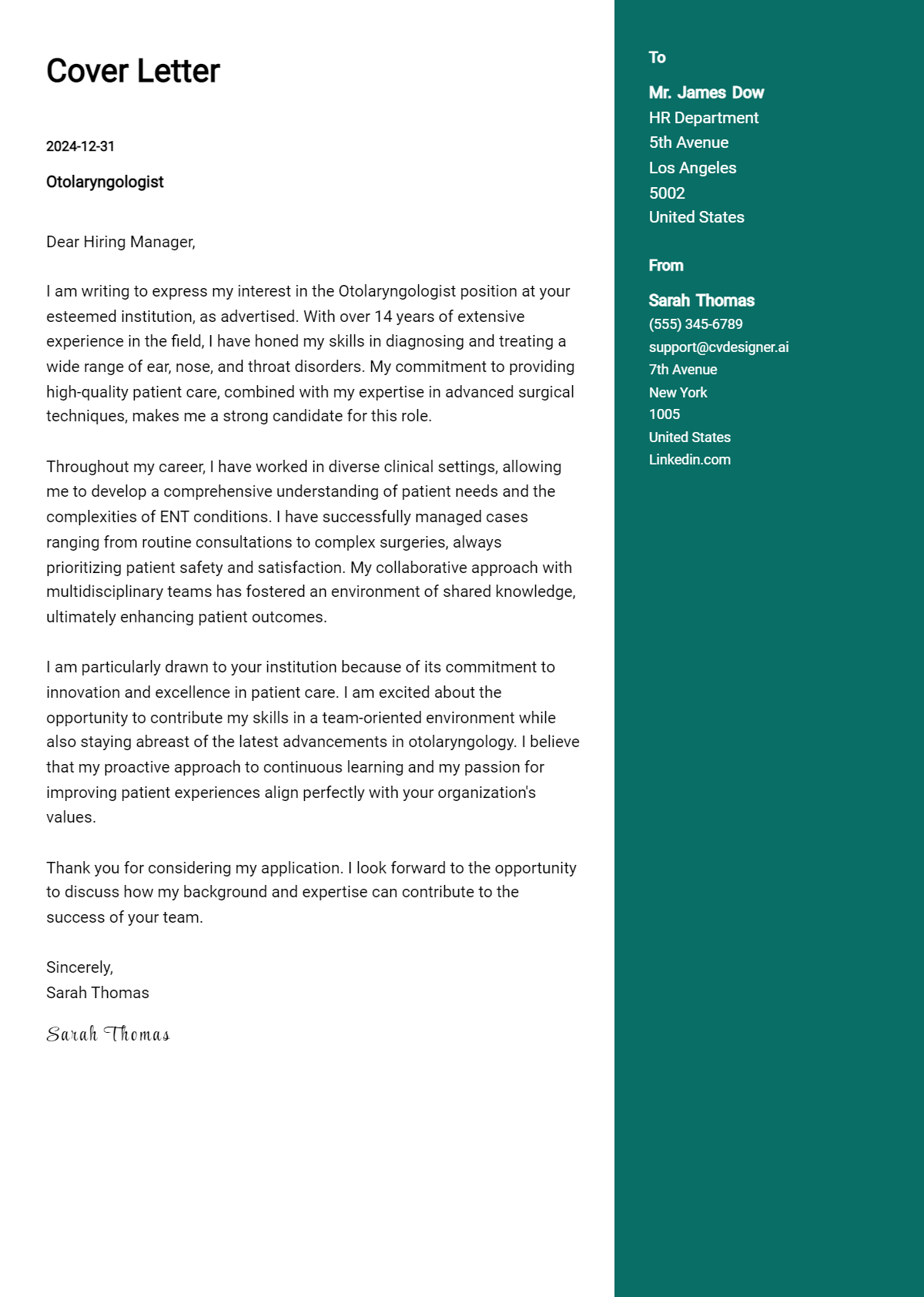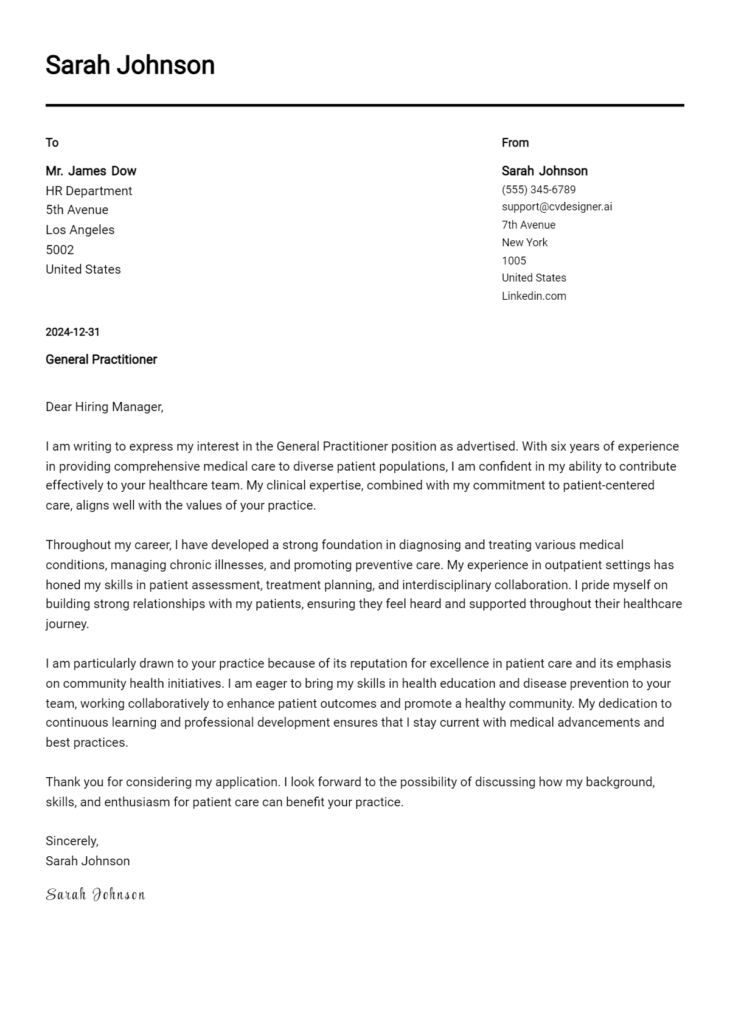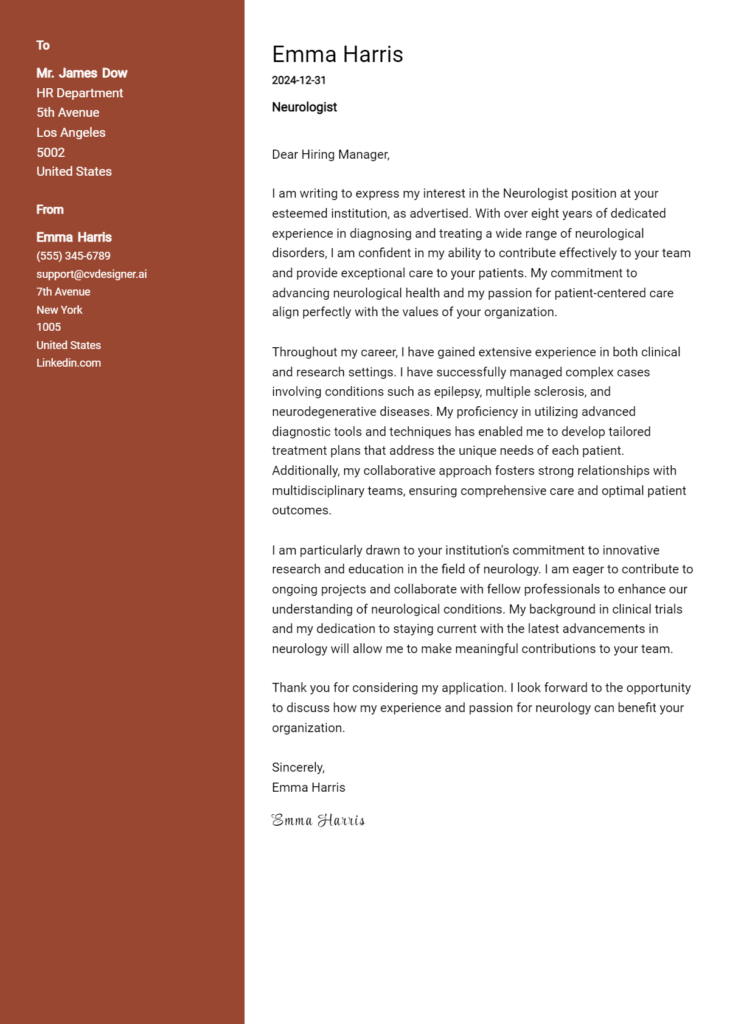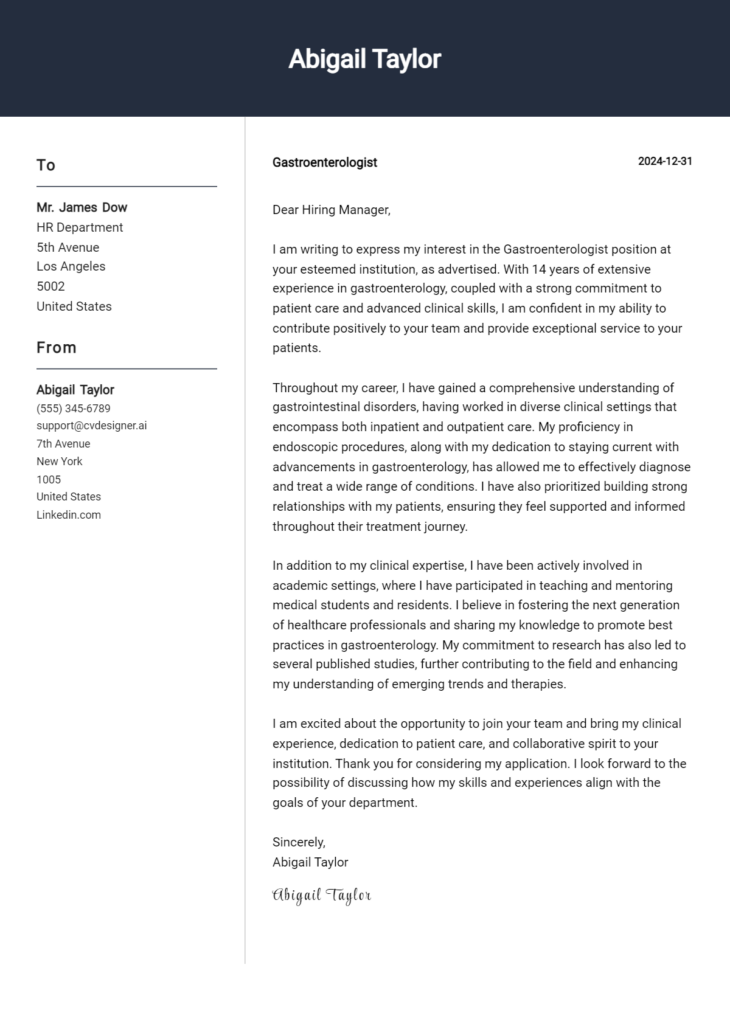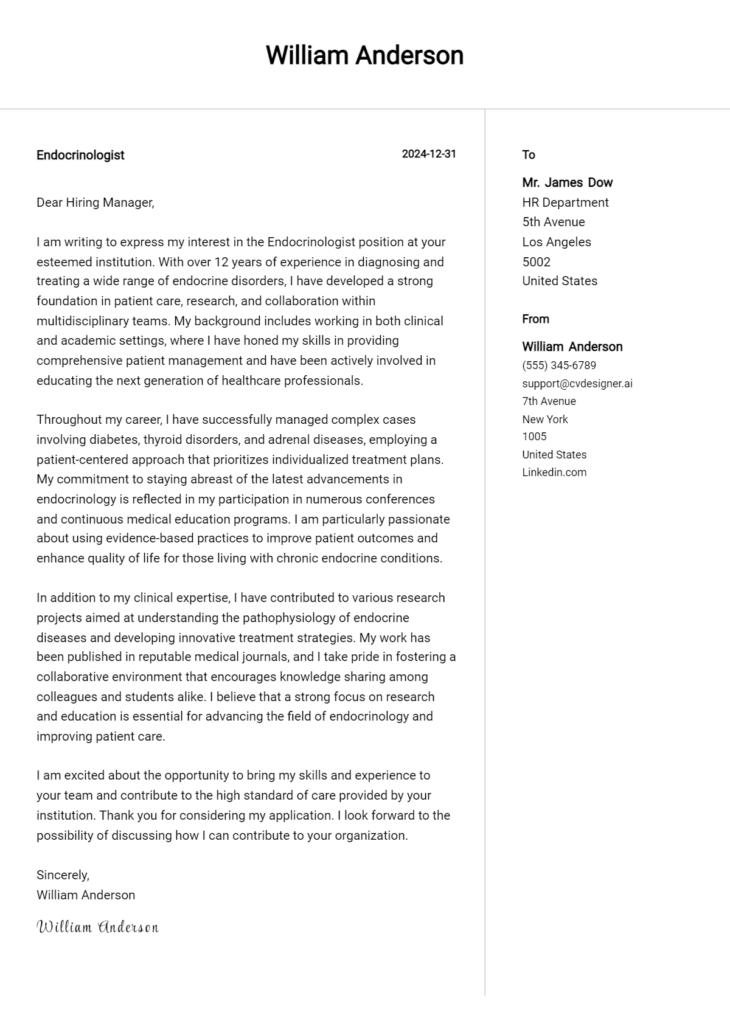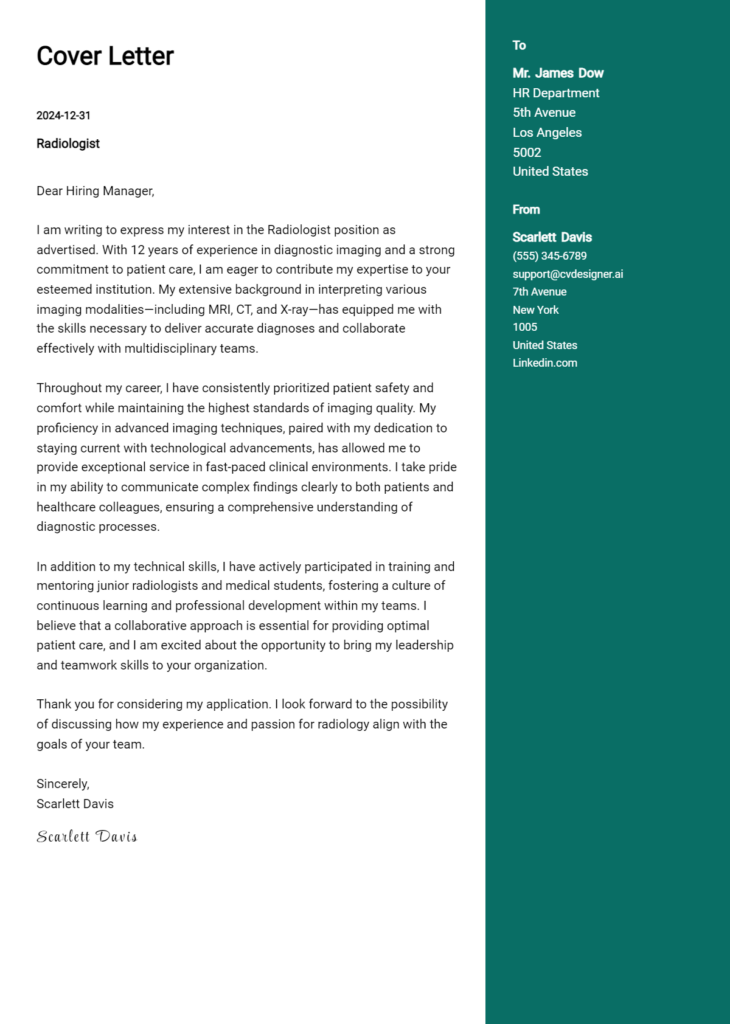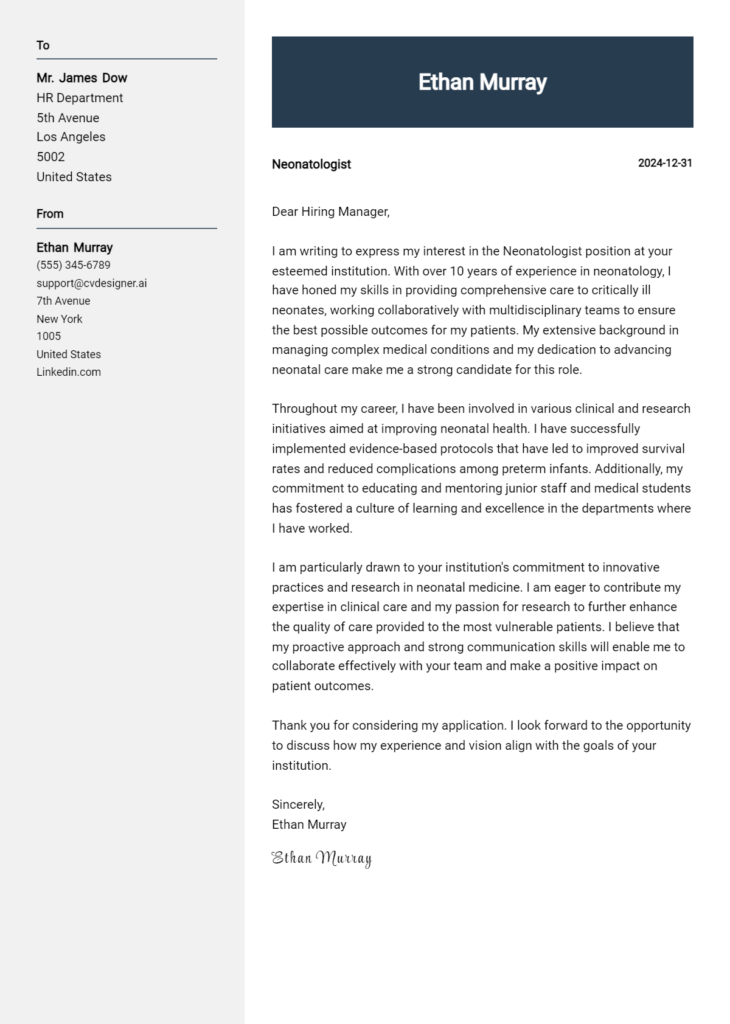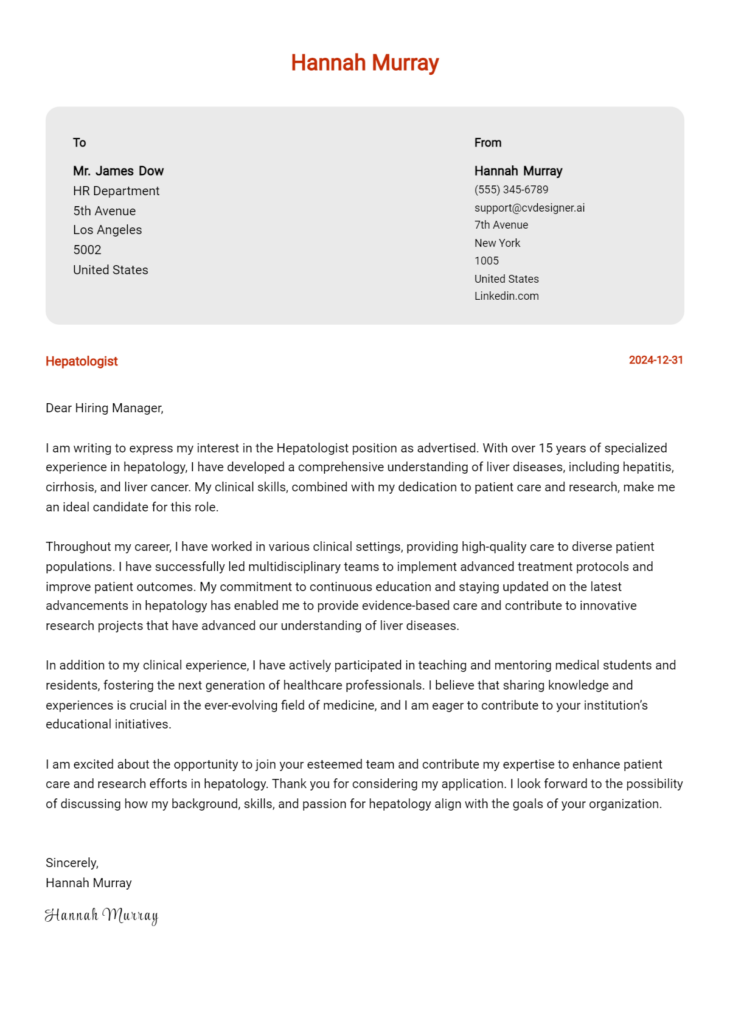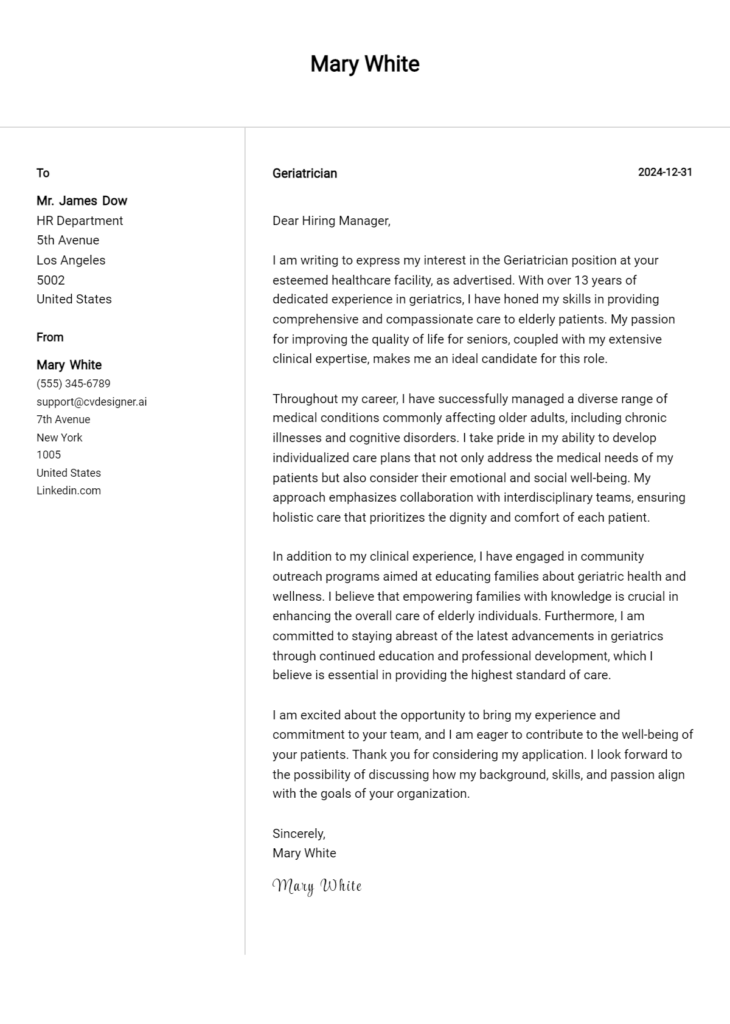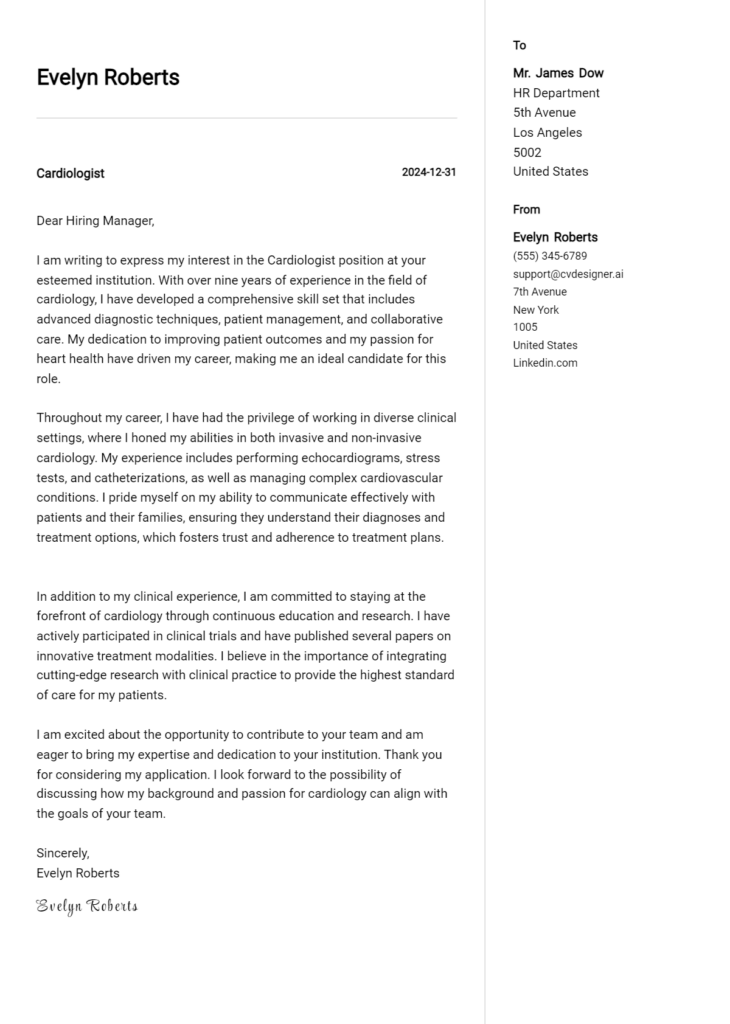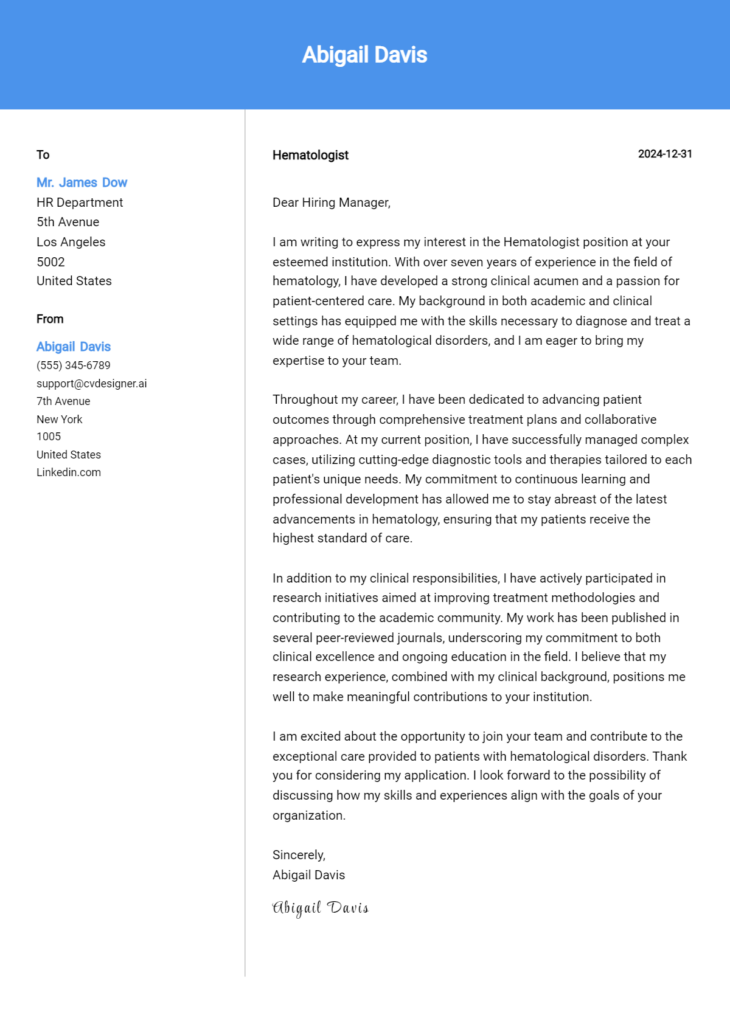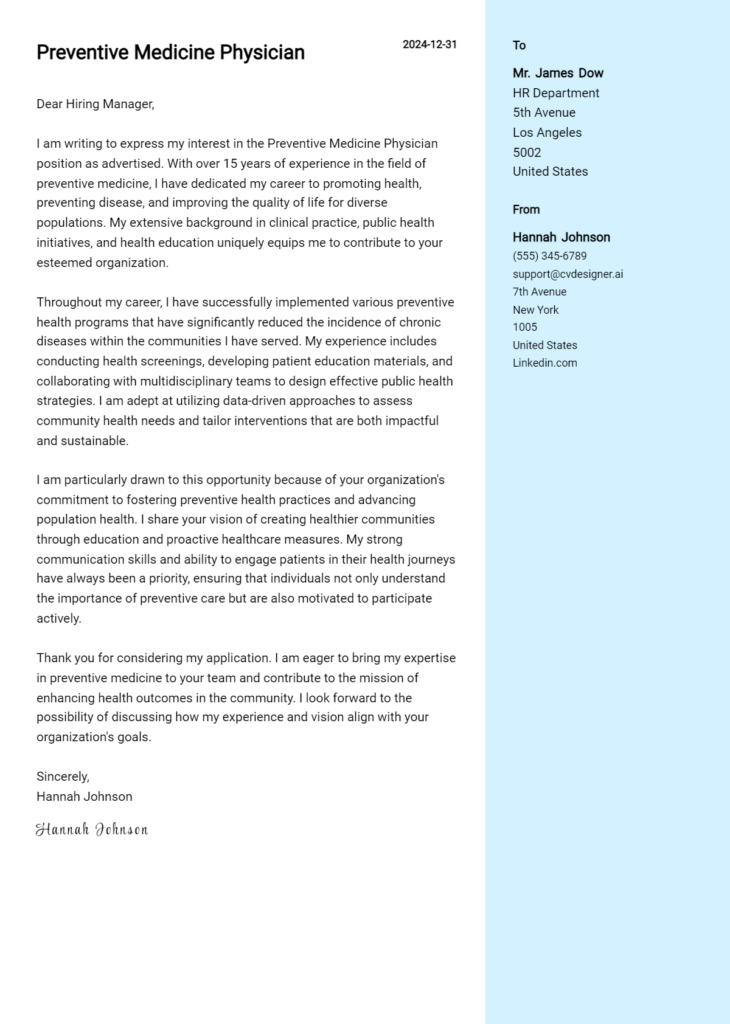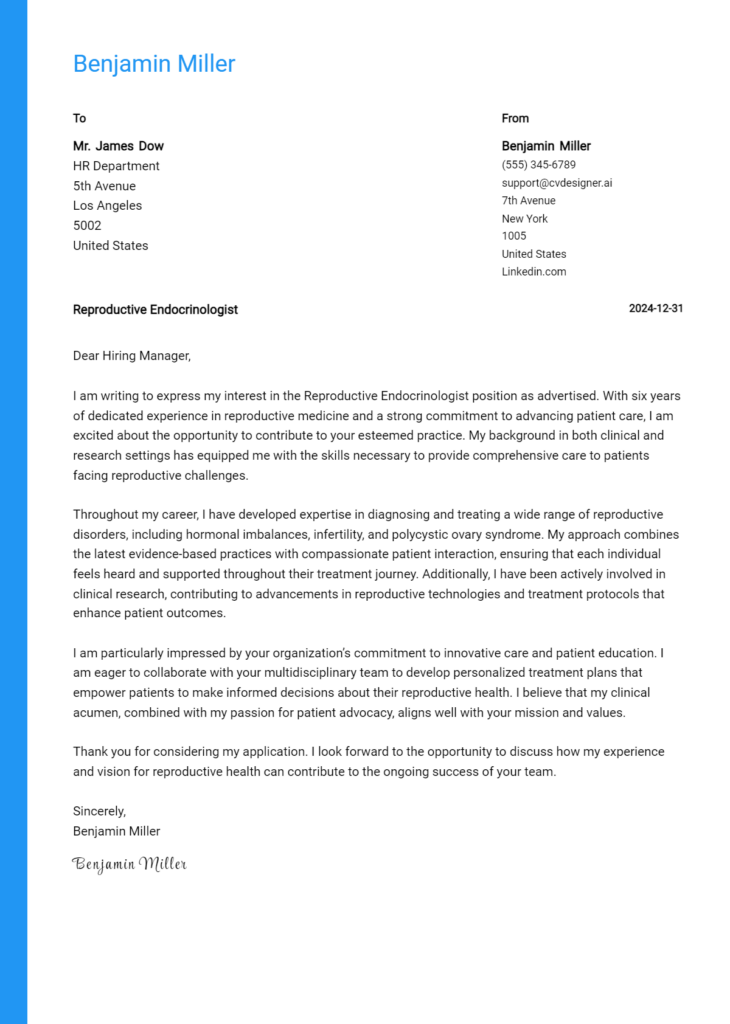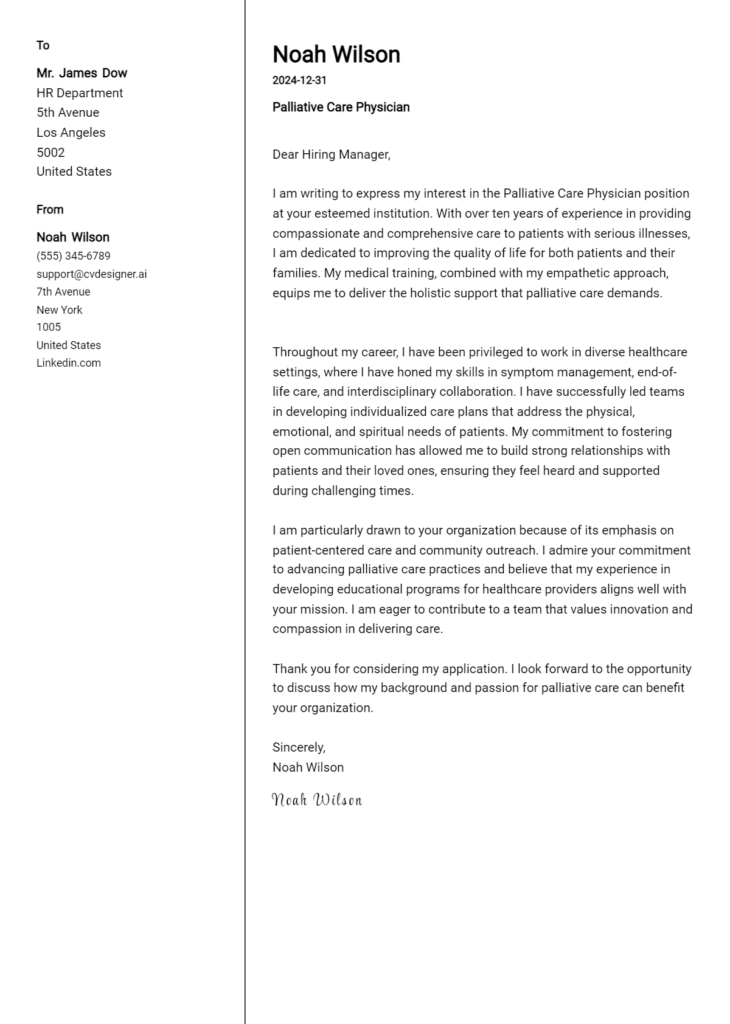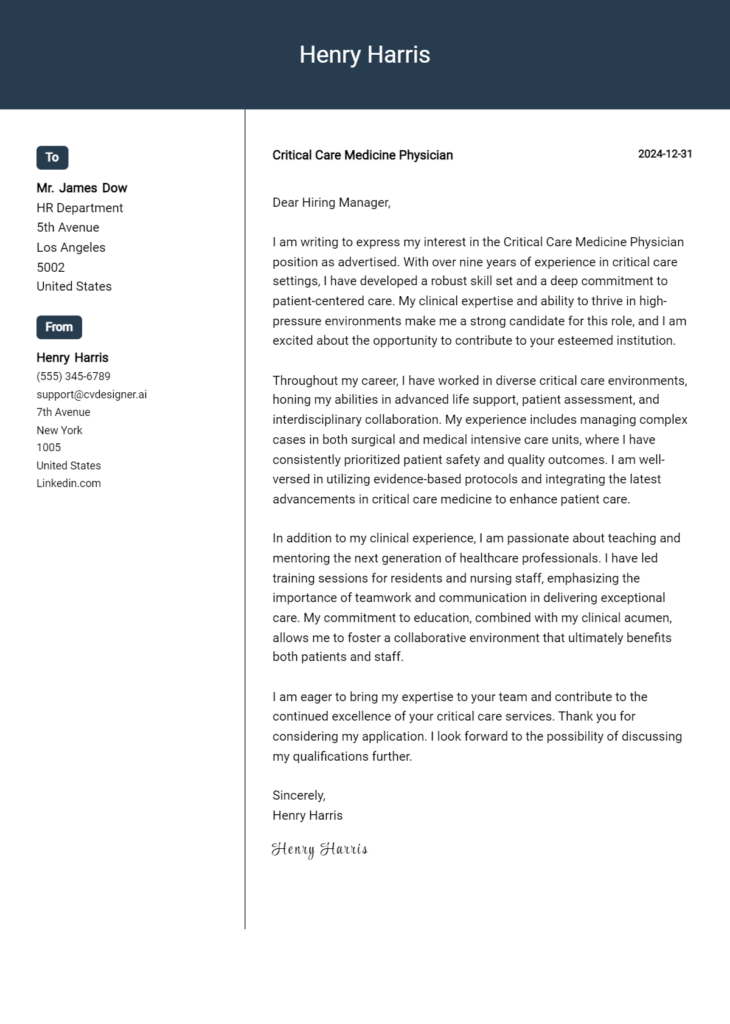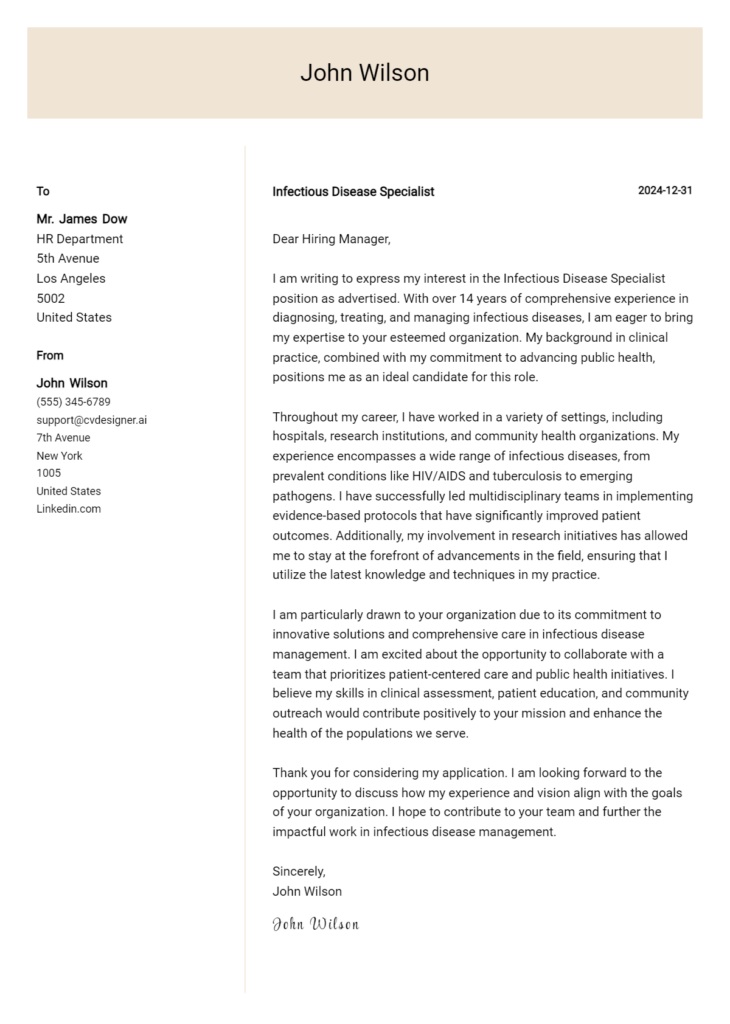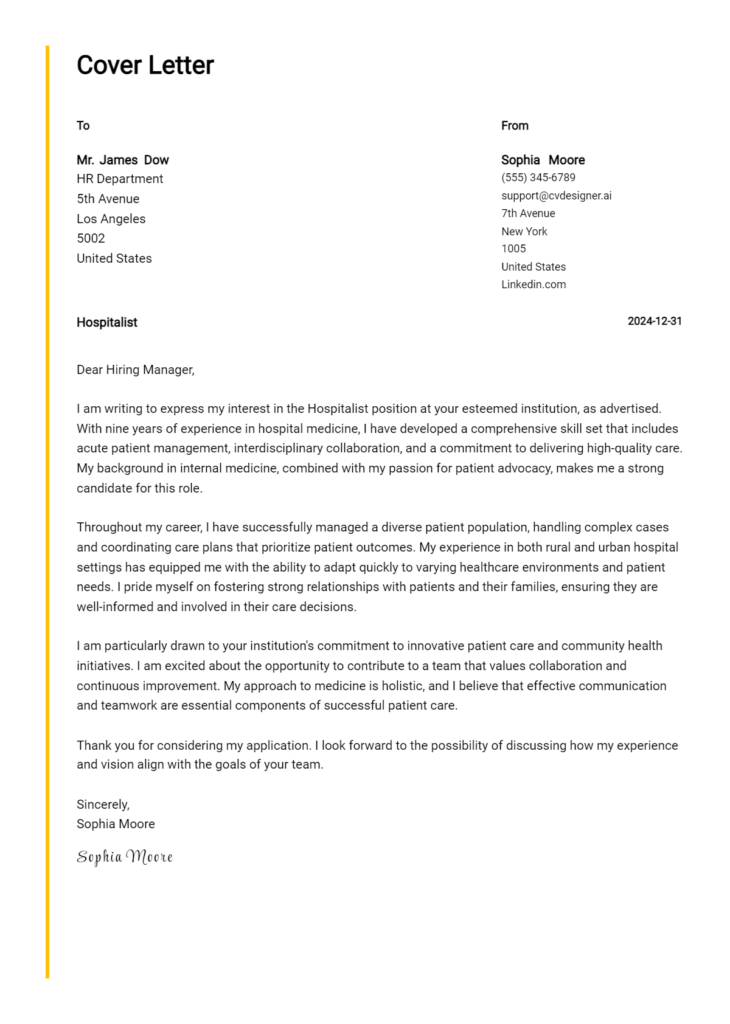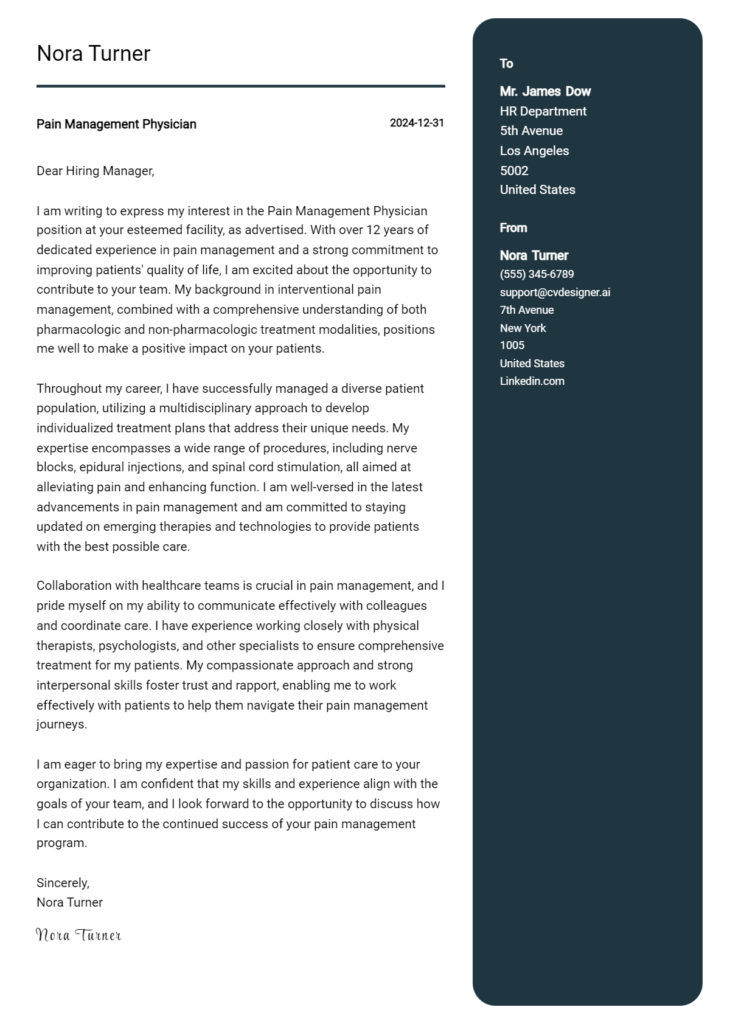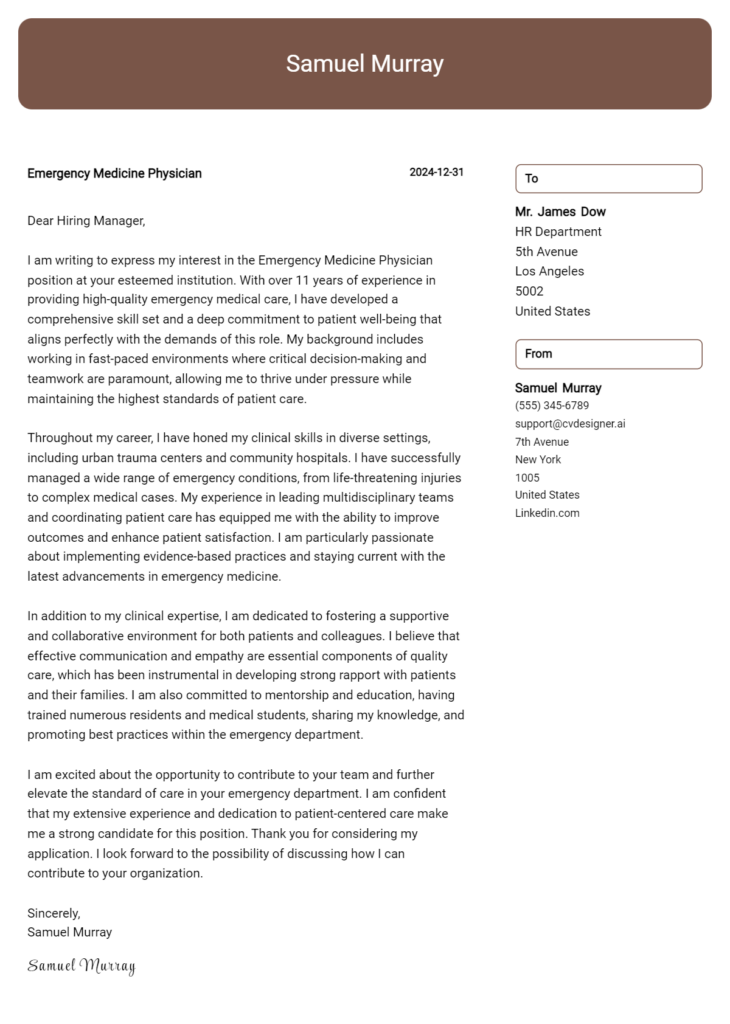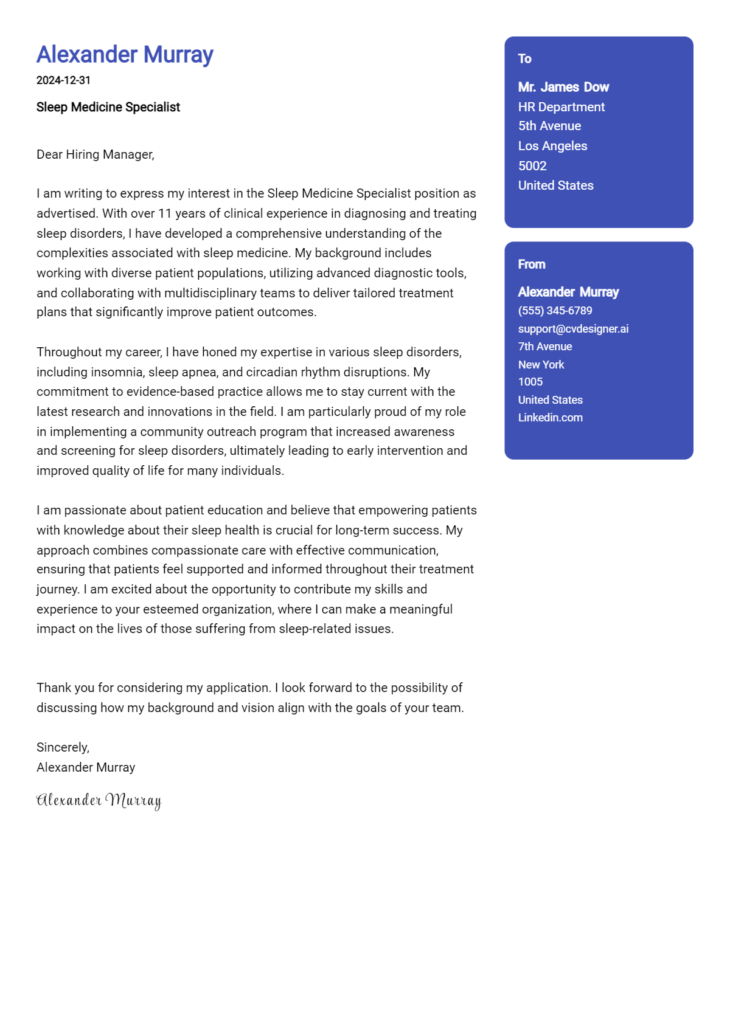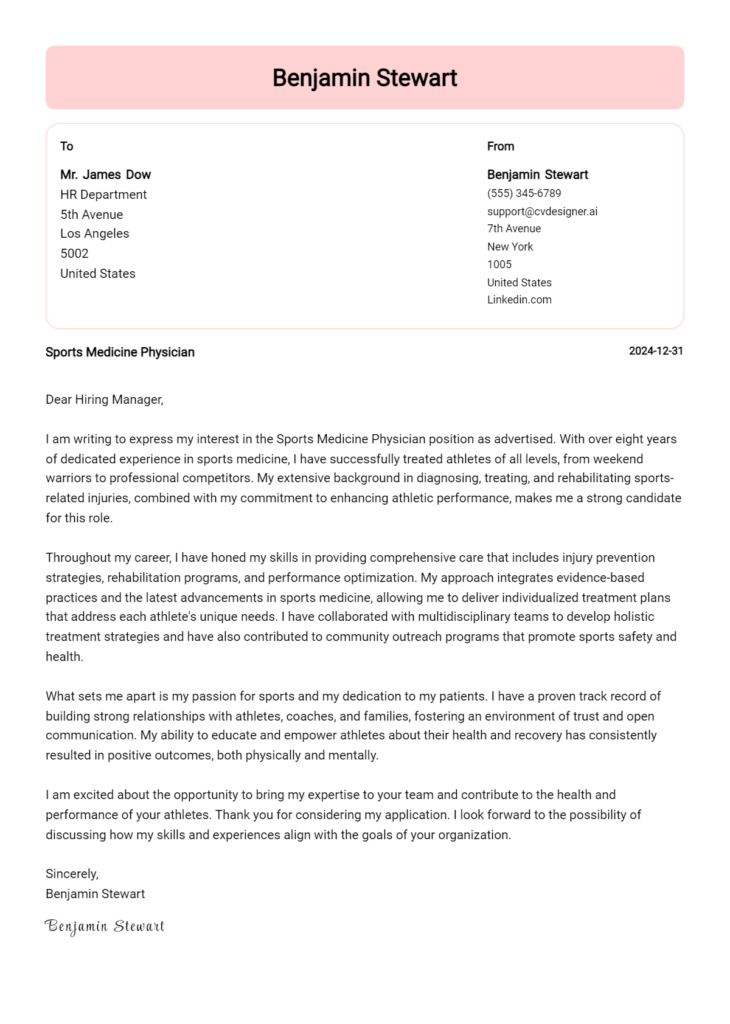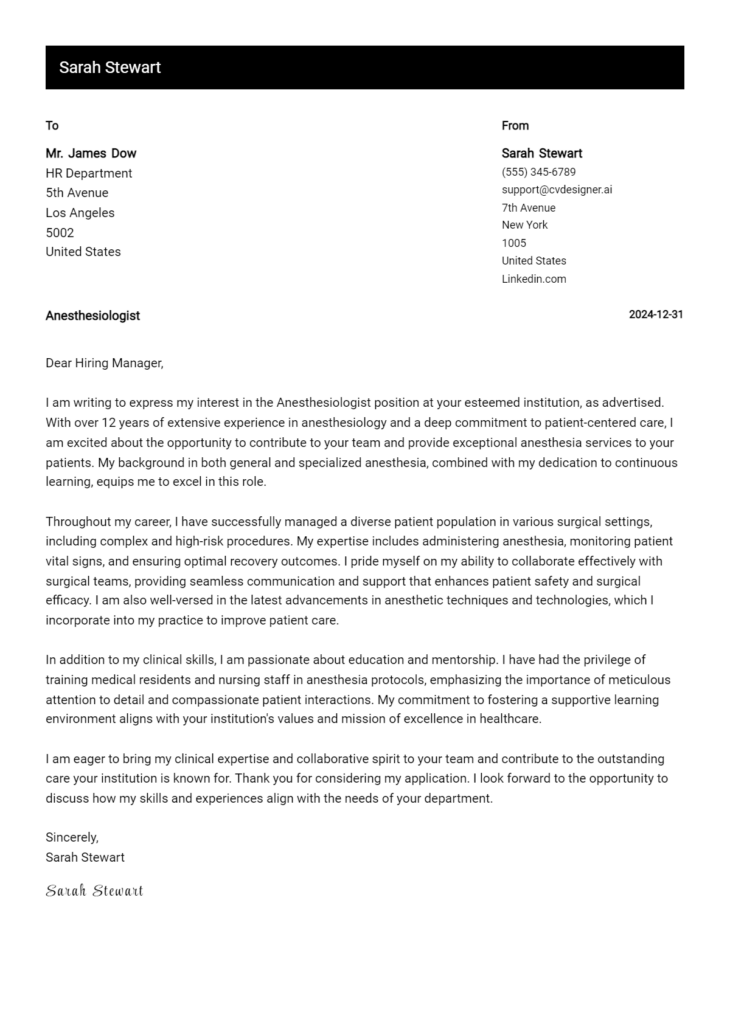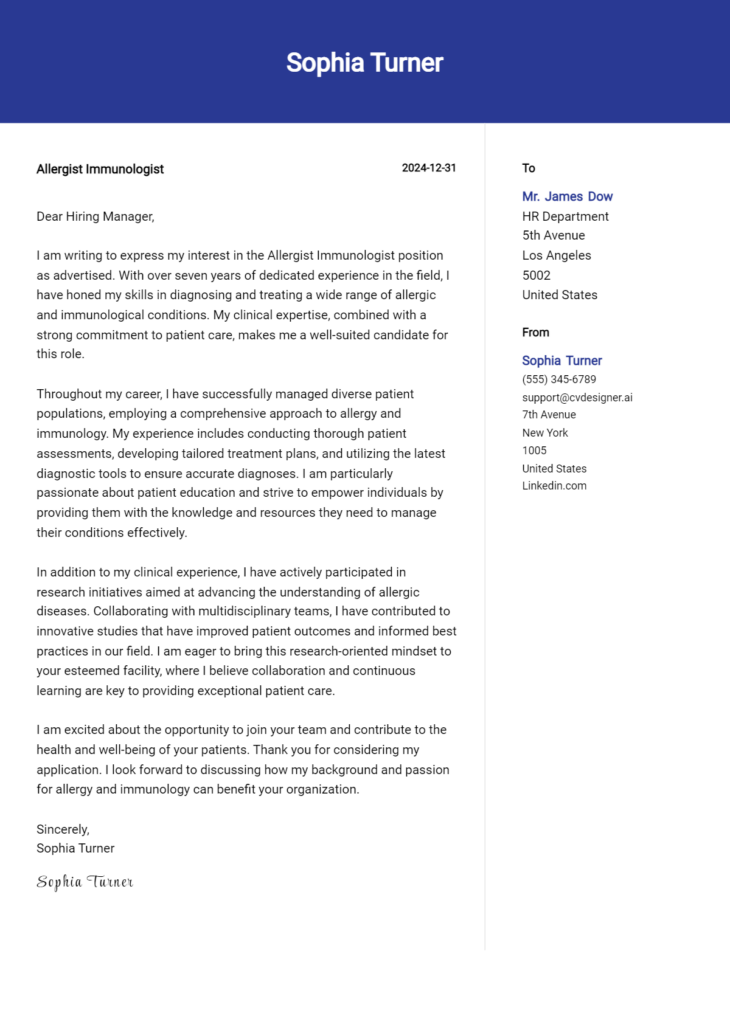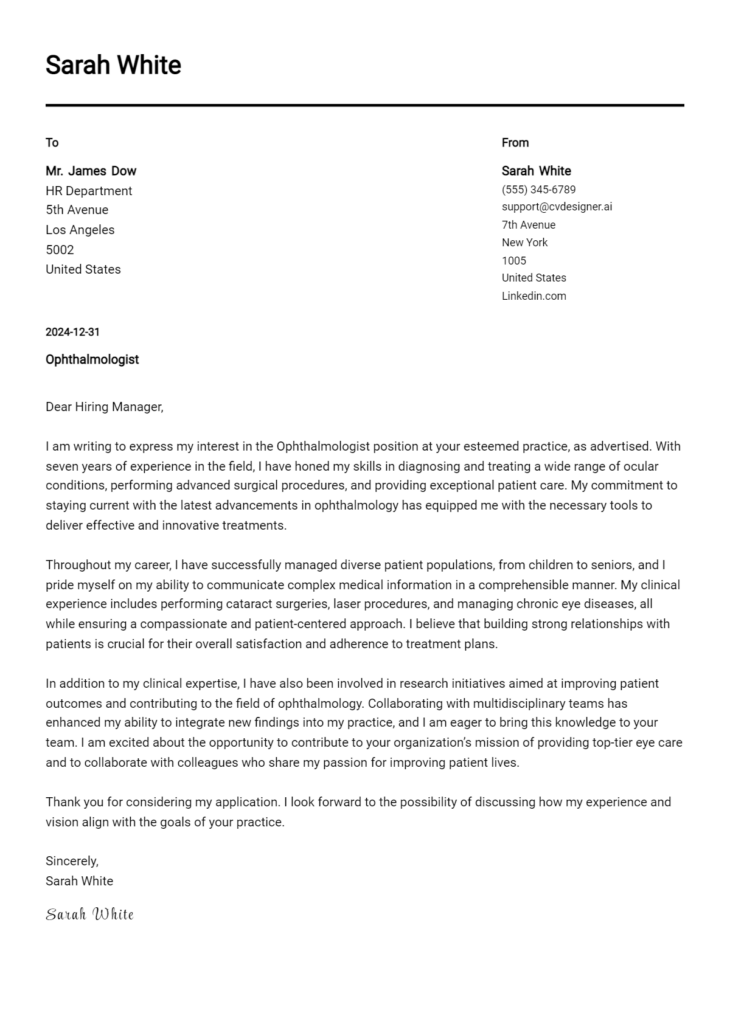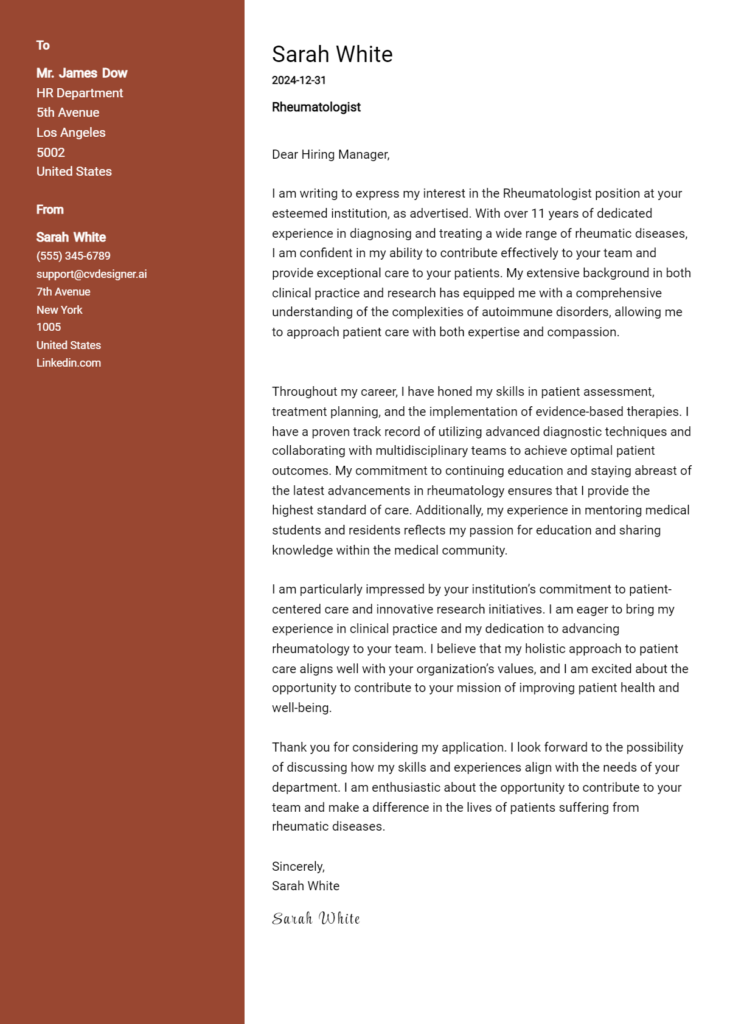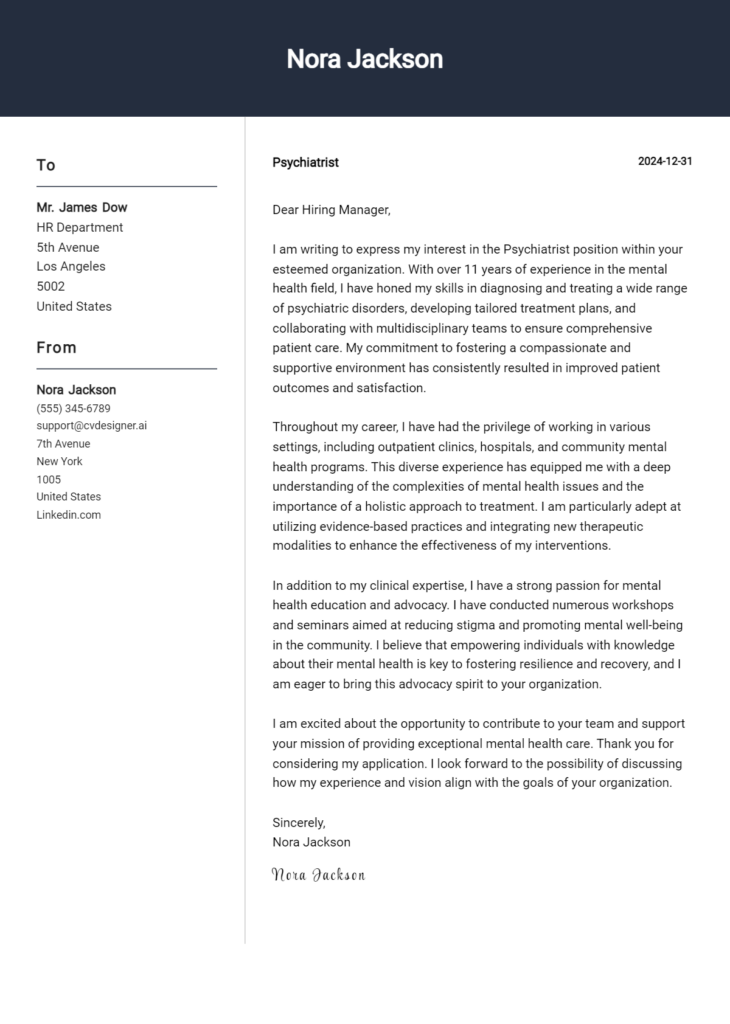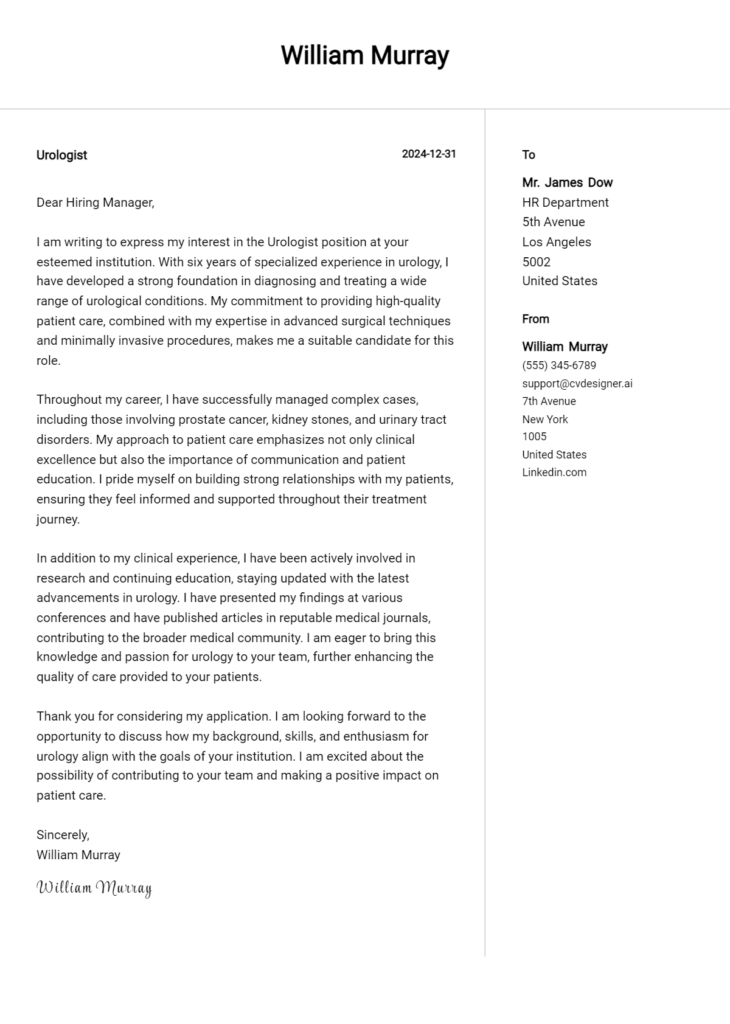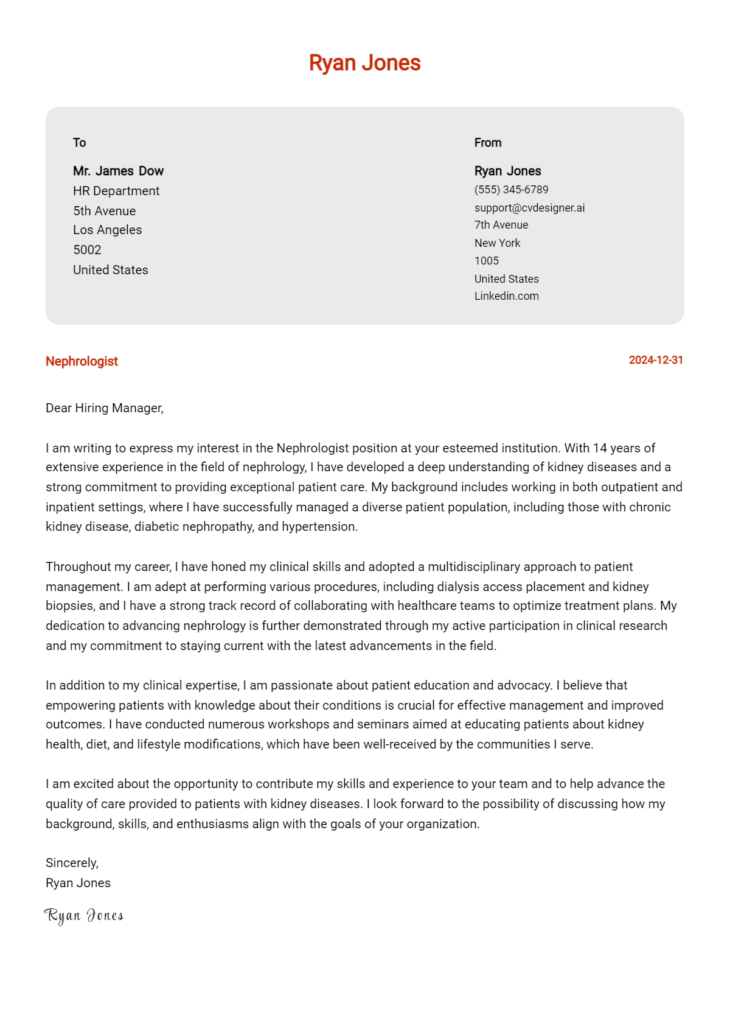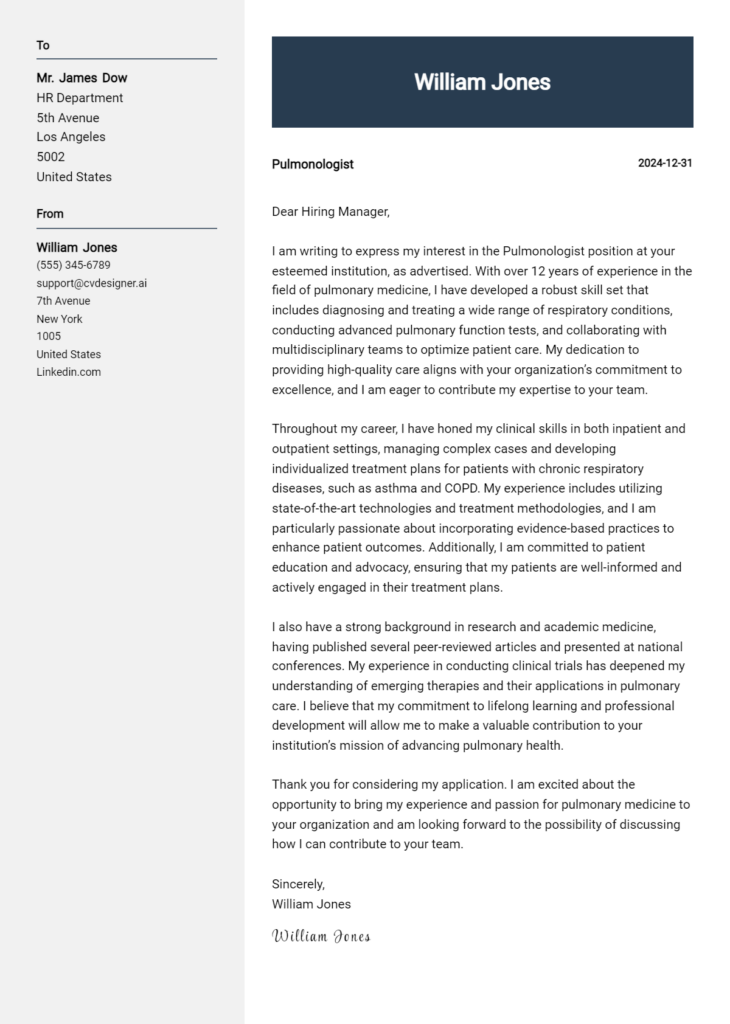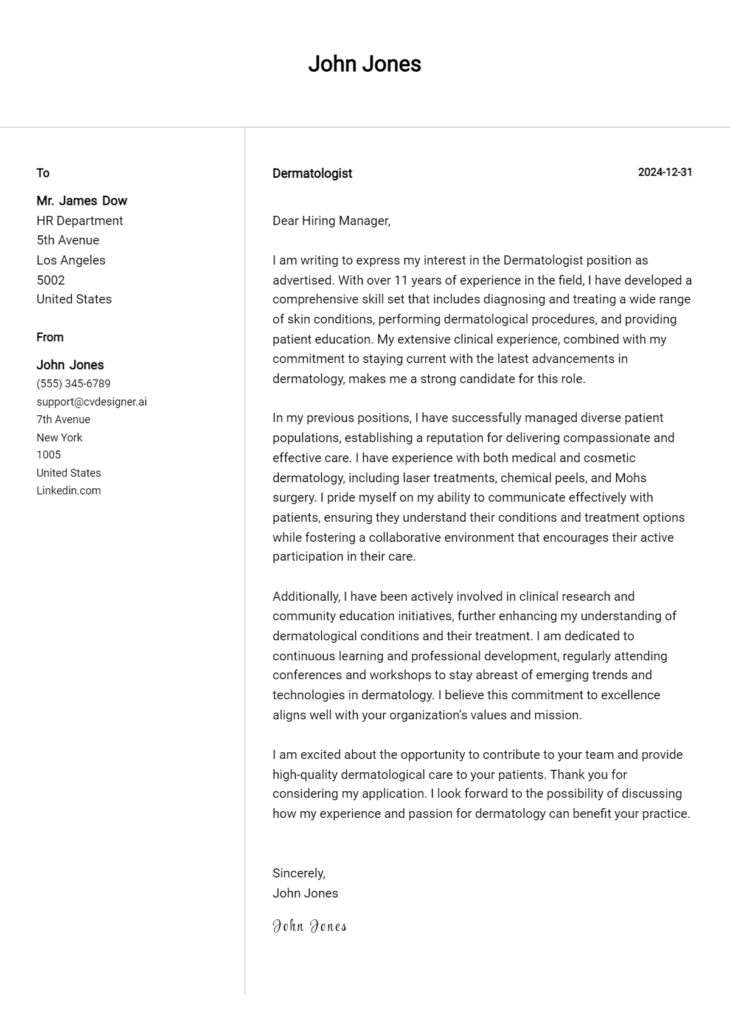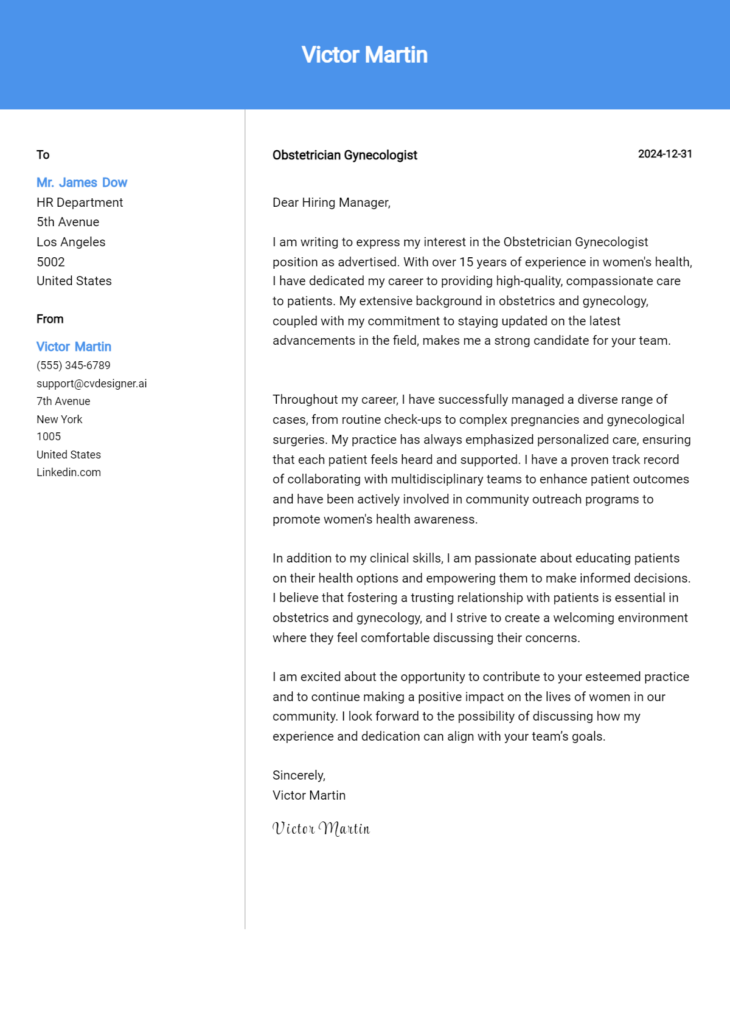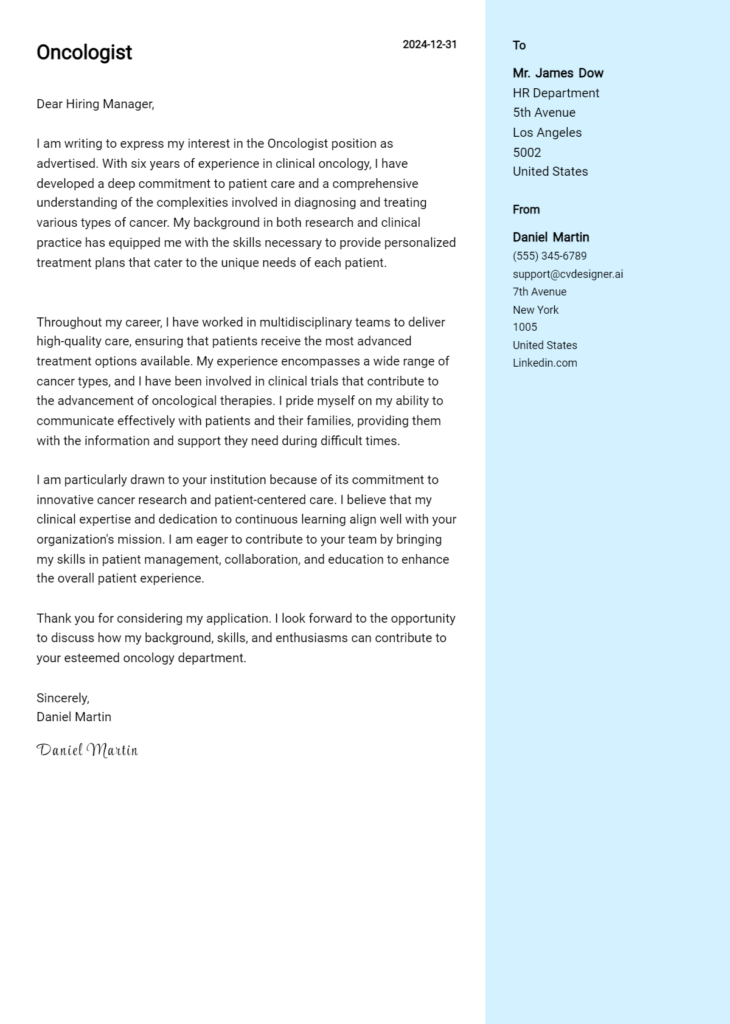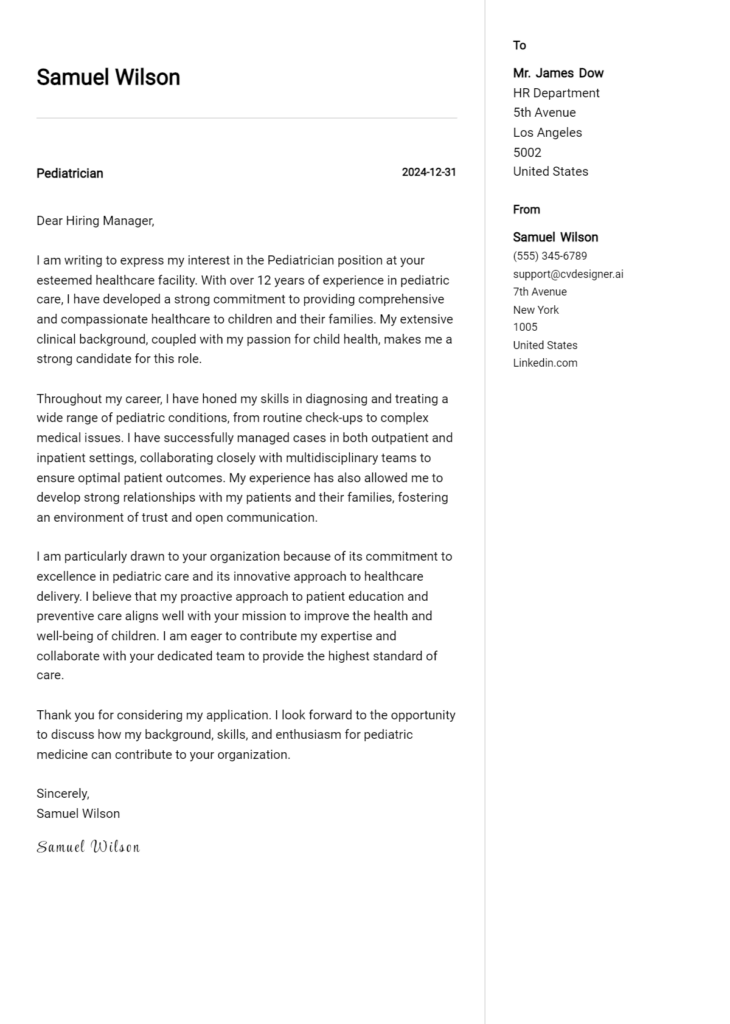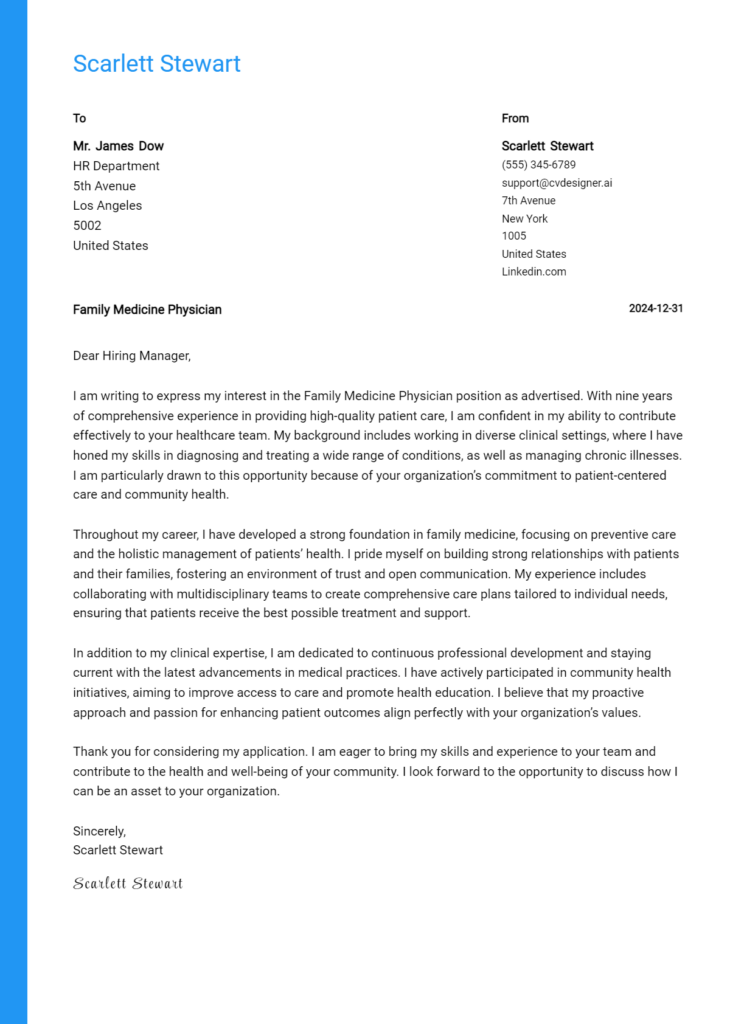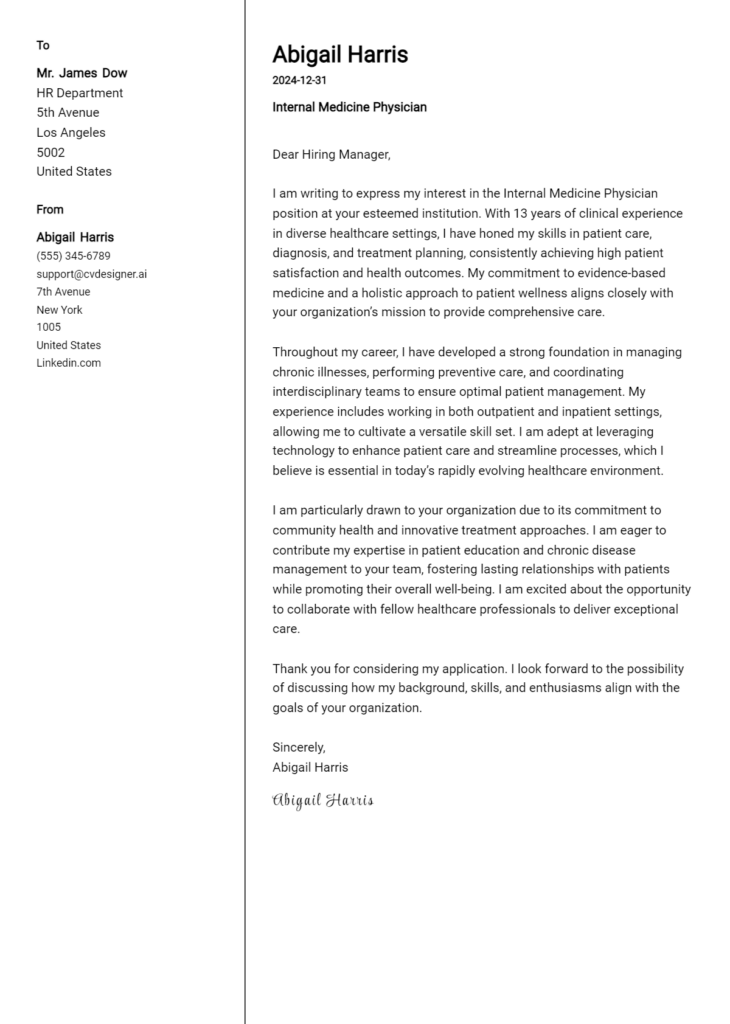Otolaryngologist Cover Letter Examples
Explore additional Otolaryngologist cover letter samples and guides and see what works for your level of experience or role.
How to Format an Otolaryngologist Cover Letter?
Crafting a compelling cover letter is essential for an otolaryngologist, as it serves as your first impression to potential employers. The way you format this document not only showcases your professional qualifications but also reflects your attention to detail and communication skills—critical attributes in the medical field. A well-structured cover letter enables you to effectively convey your expertise in diagnosing and treating ear, nose, and throat disorders, while also highlighting your commitment to patient care.
In this guide, we will outline the key components of a professional cover letter, providing specific insights and examples tailored for otolaryngologists.
We'll focus on the essential elements, including:
- Cover Letter Header
- Cover Letter Greeting
- Cover Letter Introduction
- Cover Letter Body
- Cover Letter Closing
Each section is pivotal in emphasizing your qualifications and professionalism. Let’s explore how to make your otolaryngologist cover letter stand out.
Importance of the Cover Letter Header for an Otolaryngologist
The cover letter header is a crucial component of any job application, especially for an Otolaryngologist, as it sets the tone for the entire document. A well-structured header not only provides essential contact information but also demonstrates professionalism and attention to detail, which are vital in the medical field. The header should typically include your name, address, phone number, email address, the date, and the recipient's name, title, and organization. Clarity in this section ensures that the hiring manager can easily reach out to you and understand the context of your application.
Strong Example
Dr. Jane Smith, MD 123 Health Lane Cleveland, OH 44101 (123) 456-7890 jane.smith@email.com October 15, 2023 Mr. John Doe Hiring Manager Cleveland Ear, Nose & Throat Clinic 456 Medical Ave Cleveland, OH 44102
Weak Example
Jane Smith 123 Health Lane Cleveland (123) 456-7890 10/15/23 To Whom It May Concern
Importance of the Cover Letter Greeting for an Otolaryngologist
The greeting in a cover letter is a crucial element that sets the tone for the entire document. A well-crafted greeting not only showcases professionalism but also adds a personal touch by addressing the hiring manager directly. This initial connection can significantly influence the reader's perception of the applicant, demonstrating that they have taken the time to research and personalize their application. To avoid generic greetings that can make a candidate seem indifferent, it is essential to find out the name of the hiring manager or the person overseeing the recruitment process. If their name is not readily available, a little research can often yield results, allowing the applicant to tailor their greeting effectively.
When crafting your greeting, consider these examples of strong and weak approaches:
Strong Greeting Example:
Dear Dr. Smith,
Weak Greeting Example:
To Whom It May Concern,
By opting for a personalized greeting, such as "Dear Dr. Smith," you demonstrate your commitment and respect for the position, setting a positive tone for the rest of your cover letter. In contrast, a generic greeting like "To Whom It May Concern" can convey a lack of effort and may fail to engage the reader effectively.
Importance of a Well-Crafted Cover Letter Introduction for an Otolaryngologist
A captivating cover letter introduction is crucial for an Otolaryngologist seeking to make a strong first impression on a hiring manager. This opening paragraph serves as a gateway to the rest of the application, providing an opportunity to highlight the candidate's genuine interest in the position while showcasing relevant skills and achievements. A well-crafted introduction not only grabs the reader’s attention but also sets the tone for the entire letter, demonstrating professionalism and enthusiasm for the role. In a competitive field, a strong introduction can distinguish a candidate from others, making it essential to articulate both passion and qualifications effectively.
Strong Example
Dear [Hiring Manager's Name], I am excited to apply for the Otolaryngologist position at [Hospital/Clinic Name], as I believe my extensive experience in treating complex ear, nose, and throat disorders aligns perfectly with your team’s commitment to patient-centered care. With over 10 years of clinical practice, including a focus on minimally invasive surgical techniques, I have successfully improved patient outcomes and satisfaction. I am eager to bring my expertise in advanced diagnostics and collaborative patient management to your esteemed institution.
Weak Example
Dear [Hiring Manager's Name], I am writing to apply for the Otolaryngologist job. I have been a doctor for a while and have done some surgeries. I think I would be good at this job. I hope you consider my application.
Purpose of the Cover Letter Body for an Otolaryngologist
The cover letter body for an Otolaryngologist serves as a critical component of the job application, allowing candidates to articulate their unique qualifications, relevant experiences, and the value they would bring to the organization. This section should highlight specific projects, research, or clinical accomplishments that demonstrate the candidate's expertise in treating conditions related to the ear, nose, and throat. By focusing on tangible outcomes, such as successful patient treatments or contributions to innovative procedures, the candidate can effectively convey their professional capabilities and alignment with the institution's goals.
Strong Example
I am particularly proud of my role in a multidisciplinary team that developed a novel approach to managing chronic sinusitis, which led to a 30% improvement in patient outcomes as measured by patient-reported symptom relief. Additionally, my experience in conducting over 200 successful cochlear implant surgeries has not only enhanced my surgical skills but also reinforced my commitment to improving the quality of life for patients with hearing loss. My dedication to continuous learning is exemplified by my recent completion of a fellowship in advanced airway management, which I believe aligns well with your institution's mission to provide comprehensive care.
Weak Example
I have worked as an Otolaryngologist for several years and have a lot of experience. I treat patients with various conditions and perform surgeries. I think I would be a good fit for your hospital because I like helping people.
Importance of the Cover Letter Closing for an Otolaryngologist
The closing paragraph of a cover letter is crucial for leaving a lasting impression on potential employers. It provides an opportunity to succinctly summarize your qualifications, reaffirm your enthusiasm for the position, and encourage the hiring manager to take the next steps, such as reviewing your resume or scheduling an interview. A strong closing can reinforce your suitability for the role, while a weak closing may undermine your application.
Strong Example
Thank you for considering my application for the Otolaryngologist position at [Company Name]. With over ten years of experience in diagnosing and treating a wide range of ENT disorders, coupled with my commitment to patient care and advanced surgical skills, I am excited about the opportunity to contribute to your esteemed team. I look forward to the possibility of discussing my application further and am eager to share how my expertise can benefit your practice. Please feel free to review my resume, and I hope to hear from you soon to schedule an interview.
Weak Example
Thanks for reading my letter. I think I would be okay at the job. If you want to look at my resume, it’s attached. Let me know if you want to talk.
When applying for a position as an Otolaryngologist, a well-crafted cover letter is essential to stand out in a competitive job market. This document should not only outline your qualifications but also emphasize your technical skills, problem-solving abilities, knowledge of the surgical development life cycle (SDLC), teamwork capabilities, and a genuine passion for continuous learning. The following tips will help you articulate these important aspects effectively, allowing you to make a strong impression on potential employers.
Tips for Crafting an Effective Cover Letter as an Otolaryngologist
Highlight Your Technical Skills
Detail your proficiency in specific procedures and technologies relevant to otolaryngology. Mention any advanced tools or techniques you have experience with, such as endoscopy or minimally invasive surgical methods. Tailor this section to reflect the skills mentioned in the job description, ensuring you communicate how your technical abilities align with the organization's needs.Showcase Problem-Solving Abilities
Provide examples of complex cases you have managed successfully. Describe a challenging patient scenario and how you developed a solution, emphasizing your critical thinking and decision-making skills. This not only demonstrates your expertise but also your ability to remain calm under pressure and think on your feet.Demonstrate Knowledge of SDLC
If applicable, discuss your familiarity with the surgical development life cycle (SDLC) in relation to otolaryngology. Explain how you stay updated on the latest surgical practices and innovations, and how this knowledge informs your approach to patient care. This can help illustrate your commitment to excellence and your ability to integrate new methodologies into your practice.Emphasize Teamwork and Collaboration
Highlight your experience working within interdisciplinary teams. Discuss how you have collaborated with other healthcare professionals to deliver comprehensive patient care. Mention specific instances where teamwork has led to improved patient outcomes, showcasing your ability to communicate effectively and build strong professional relationships.Express a Passion for Continuous Learning
Convey your dedication to ongoing professional development. Mention any relevant certifications, workshops, or courses you have completed, as well as your involvement in professional organizations related to otolaryngology. This demonstrates your commitment to staying current in the field and your drive to enhance your skills, which is appealing to potential employers.
By following these tips, candidates can create a compelling cover letter that effectively showcases their qualifications and enthusiasm for the role. For additional assistance, consider exploring various cover letter templates or using a cover letter builder to streamline the writing process.
Common Mistakes to Avoid in a Otolaryngologist Cover Letter
Avoiding common mistakes in your cover letter is crucial for making a strong impression and increasing your chances of landing an interview as an otolaryngologist. Here are some pitfalls to steer clear of:
Generic Salutation: Using a generic greeting like "To Whom It May Concern" can make your letter feel impersonal. Instead, address the hiring manager by name for a more tailored approach.
Lack of Specificity: Failing to mention specific skills or experiences related to otolaryngology can weaken your application. Highlight relevant qualifications and achievements to demonstrate your expertise.
Overly Long or Short: A cover letter that is too lengthy can lose the reader's interest, while a very short one may not provide enough information. Aim for a concise yet informative letter; usually, one page is ideal. For guidance on structure, check out cover letter format.
Ignoring the Job Description: Not aligning your cover letter with the job description can make you appear unfit for the role. Use keywords from the job posting to show that you are a great match for the position.
Spelling and Grammar Errors: Typos and grammatical mistakes can undermine your professionalism. Always proofread your letter or ask a colleague to review it before sending.
Lack of Enthusiasm: A cover letter that sounds flat or uninspired may fail to convey your passion for otolaryngology. Use a positive tone and express your excitement about the opportunity.
Failure to Include a Call to Action: Ending your letter without a clear call to action can leave the reader unsure of your intentions. Conclude by inviting them to discuss your application further or express your desire for an interview.
By avoiding these common mistakes, you can create a compelling cover letter that stands out. For more examples and inspiration, explore our collection of cover letter examples.
Cover Letter FAQs for Otolaryngologist
What should I include in my cover letter as an Otolaryngologist?
When crafting your cover letter as an Otolaryngologist, begin with a strong introduction that states your interest in the position and your relevant qualifications. Highlight your medical education, residency, and any fellowships, particularly in otolaryngology. Emphasize your clinical skills, such as experience with surgical procedures or patient management. Additionally, mention any research, publications, or presentations that demonstrate your commitment to advancing the field. Tailoring your cover letter to the specific institution or practice will also show your genuine interest and knowledge about their work. Finally, conclude with a call to action, expressing your eagerness for an interview and to discuss your contributions to their team.
How can I make my cover letter stand out?
To make your cover letter stand out, focus on personalization and specificity. Research the organization and mention specific programs, values, or recent developments that align with your professional goals. Use quantifiable achievements to demonstrate your impact, such as patient outcomes or successful initiatives you've led. Incorporating a compelling narrative about your journey in otolaryngology can also engage the reader. Additionally, maintain a professional yet approachable tone, reflecting your personality and passion for the specialty. Finally, ensure your formatting is clean and your writing is free of errors, as attention to detail is crucial in the medical field.
Should I include my clinical experience in my cover letter?
Yes, including your clinical experience in your cover letter is essential. This section should detail your hands-on experience in evaluating and treating patients with ear, nose, and throat disorders. Highlight any special techniques or technologies you are proficient in, as well as your experience with various patient demographics. If you’ve worked in diverse settings, such as hospitals, private practices, or academic institutions, mention these to showcase your adaptability. Discuss any leadership roles or interdisciplinary collaborations that illustrate your teamwork and communication skills. This information not only showcases your qualifications but also reassures potential employers of your capability to handle the responsibilities of the position.
How long should my cover letter be?
Your cover letter should ideally be one page long, with a concise yet comprehensive format. Aim for three to four paragraphs that clearly outline your qualifications, experiences, and motivations for applying to the position. Each paragraph should be focused and relevant, avoiding unnecessary fluff. Use clear, professional language, and make sure to include white space to enhance readability. While it’s important to be thorough, remember that hiring managers often skim documents, so be direct and impactful with your content. A well-structured, one-page cover letter demonstrates your ability to communicate effectively, a vital skill for any healthcare professional.
Build your Cover Letter in minutes
Use an AI-powered cover letter builder and have your letter done in 5 minutes. Just select your template and our software will guide you through the process.

